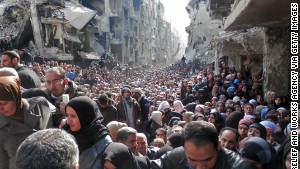"The regime, following the loss of Idlib, is now concerned it could also lose the southern city of Daraa, where more moderate Free Syrian Army (FSA) rebels have been making significant gains. The regime has started to move its administrative bureaus out of the area as it did just before Idlib's fall.
Yarmouk is only 100 kilometers away from Daraa. If ISIS, now in control of the camp, uses it as a base to attack the FSA in Daraa, it would save the Syrian regime from having to fight that battle itself.

This tactic is not new. ISIS has been attempting to gain a foothold in FSA-controlled southern Syria for several months, relying on local recruitment of Syrians and Palestinians to have a presence in an area. Throughout this time, the Syrian regime has also been indirectly enabling ISIS access to the south because this serves the regime's aim of crushing the moderate opposition in the area.
But the Yarmouk scenario is also about countering the gains of al-Nusra in Idlib. Unable to overwhelm al-Nusra militarily, the Syrian regime tried to indirectly use Yarmouk as a way to discredit al-Nusra through facilitating the access of ISIS to the camp.
After ISIS was provoked by a Palestinian brigade in the Yarmouk camp, Aknaf Bayt al-Maqdis -- a group which had threated ISIS after accusing it of murdering one of its leaders -- the regime did not stand in the way of ISIS fighters who raided the camp. The regime had already besieged Yarmouk for several months and starved its residents, so it was no regime stronghold. Allowing ISIS to take over the camp was only a small sacrifice for Assad.
In return, the regime calculated that ISIS' takeover of the camp would achieve a much bigger gain: sparking a rift within al-Nusra.
Although the group is officially an enemy of ISIS -- the latter has declared al-Nusra an apostate -- some al-Nusra brigades in southern Syria have personal connections with ISIS leaders.
The ISIS advance in Yarmouk pushed the al-Nusra brigades that are sympathetic to ISIS to help it on the ground. The attack also forced the al-Nusra brigades opposed to ISIS to stay out of the battle so as not to spark a hot war between the two groups that would detract them from achieving their objectives (establishing a caliphate in the case of ISIS, and fighting the regime in the case of al-Nusra).
The regime's calculation was that this contradiction between the actions of some al-Nusra brigades and the "neutrality" of others would embarrass the leaders of al-Nusra and hurt the group's credibility.
Indeed, public criticisms of al-Nusra's apparent flip-flopping in Yarmouk have already begun to emerge -- and rival groups see in the Yarmouk scenario an opportunity to reassert themselves in the face of al-Nusra.
Damaging Jabhat al-Nusra's credibility is crucial for Assad. Unlike ISIS, which has largely refrained from attacking the regime as it concentrates on building its state-within-a-state, al-Nusra in particular has always had fighting Assad its sole raison d'être.
In Idlib, Jaysh al-Fateh -- which again, is partly comprised of al-Nusra -- is now working on creating a joint civilian-military administration similar to the model offered by the FSA in the south. This model is more acceptable to the local population than an Islamist mode of governance, and is a way for al-Nusra as well as the FSA to demonstrate that they can offer a better alternative to the regime. Any further growth of al-Nusra therefore means a growing concrete threat to the Syrian regime.
The takeover of the Yarmouk camp has therefore been a wily and tactical maneuver by the Syrian regime. But its success remains to be seen. So far, al-Nusra has released a statement distancing itself from the events in Yarmouk, and has handed over control of the main crossing on the Syrian-Jordanian border near Daraa to the FSA. Whether this indicates that the Islamist Jaysh al-Fateh and the moderate FSA are exploring a pragmatic formula to increase their cooperation in the future is an open question."
No comments:
Post a Comment